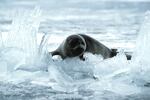It's not in your head. Seattle's Lake Washington is getting warmer and more comfortable to swim in every year. And it's not the only lake experiencing a rapid rise in temperature.
For the first time, scientists have brought together a comprehensive data set from 235 lakes around the world, containing more than half of the world's fresh water. The study, which was published in the journal Geophysical Research Letters, found that globally, lake temperatures are rising more rapidly than ocean or air temperatures – at an average uptick of .61 degrees Fahrenheit each decade.
"It's there every way you cut the data," said co-author Stephanie Hampton, director of Washington State University's Center for Environmental Research, Education and Outreach, "and they're warming somewhat more rapidly than we expected."
Warming lake temperatures contribute to stronger blooms of algae, which can be toxic. Species of fish that rely on cooler water temperatures – like the salmon that swim through Lake Washington to spawn in nearby rivers – will also suffer.
The study found that colder, ice-covered lakes are experiencing more pronounced warming. In northern latitudes, lakes showed an average increase of up to 1.3 degrees Fahrenheit per decade. Ice, Hampton explained, serves as an insulation layer, keeping the water below at a constant temperature.
"As ice duration gets shorter, the lake is really exposed to the environment in a way that it's not when it's under ice," Hampton said. "The shorter the ice season, the more rapidly the temperature can go up."
Hikers in the Northwest have probably experienced this warming first hand. That rewarding plunge into an alpine lake at the end of a steep climb can be less shriek-inspiring than it was in the past, perhaps even enjoyable. But for lakeside communities that rely on ice to get around, such as the small villages that dot the shores of Lake Baikal, in Russia, a loss of ice represents a lost way of life.
"The villages don't have roads to them so people depend on being able to cross the lake in boats or drive across the ice," said Hampton, who has conducted research on Lake Baikal. As the ice thins it will no longer be safe to drive across, but could still be too thick for boats to make the journey.

The "nerpa" seal, as it's called in Russian, is the world's only freshwater seal. It makes caves in the ice on Lake Baikal to provide safety for its pups.
Vadim Kantor, Greenpeace
Lake Baikal is also home to the world’s only freshwater seal, the Nerpa (in Russian). The seal evolved in Lake Baikal over thousands of years, and it’s reproductive success depends on the lake being covered in ice for large portions of the year. The female seals create snow-ice caves on top of the frozen lake, which provide protection for their young pups from predators. Loss of ice will force the pups into the water before they are ready. The seals also spend time on the surface of the ice when they molt. If the ice recedes too fast they’ll be forced off the ice before molting is complete.
Temperature increases in tropical lakes, such as the African Great Lakes, are not as pronounced, according to the study, but even small shifts in temperature could push some fish species past the tipping point, which could be especially problematic in areas where local populations depend on lake fishing for subsistence.
In the Pacific Northwest, cold water fish experience stress and mortality in warmer waters. Fisheries in rivers around the region
or curtailed this past summer because of high river temperatures.
“The concern people really have is in marginal areas where the temperatures are just barely suitable for cold water fish,” said Mike Brett, professor of environmental engineering at the University of Washington. His
on Lake Washington showed a rise of 3 degrees Fahrenheit over a 35 year period from the 60s to the 90s - a warming rate that exceeds the global average found in the new study.
"As the climate warms, we lose those habitats that were suitable for cold water fish. In this state, the cold water fish – the trout and salmon – are the ones people place a high value on," Brett said.
Brett, who was not directly involved in the new study, said it provides a valuable perspective on the broader warming patterns in lakes around the world.
"It's very important to throw all that data together into a single analysis. By looking at them at the same time we're seeing the same trends we're seeing for these more dramatic cases – Lake Washington, Lake Tahoe."